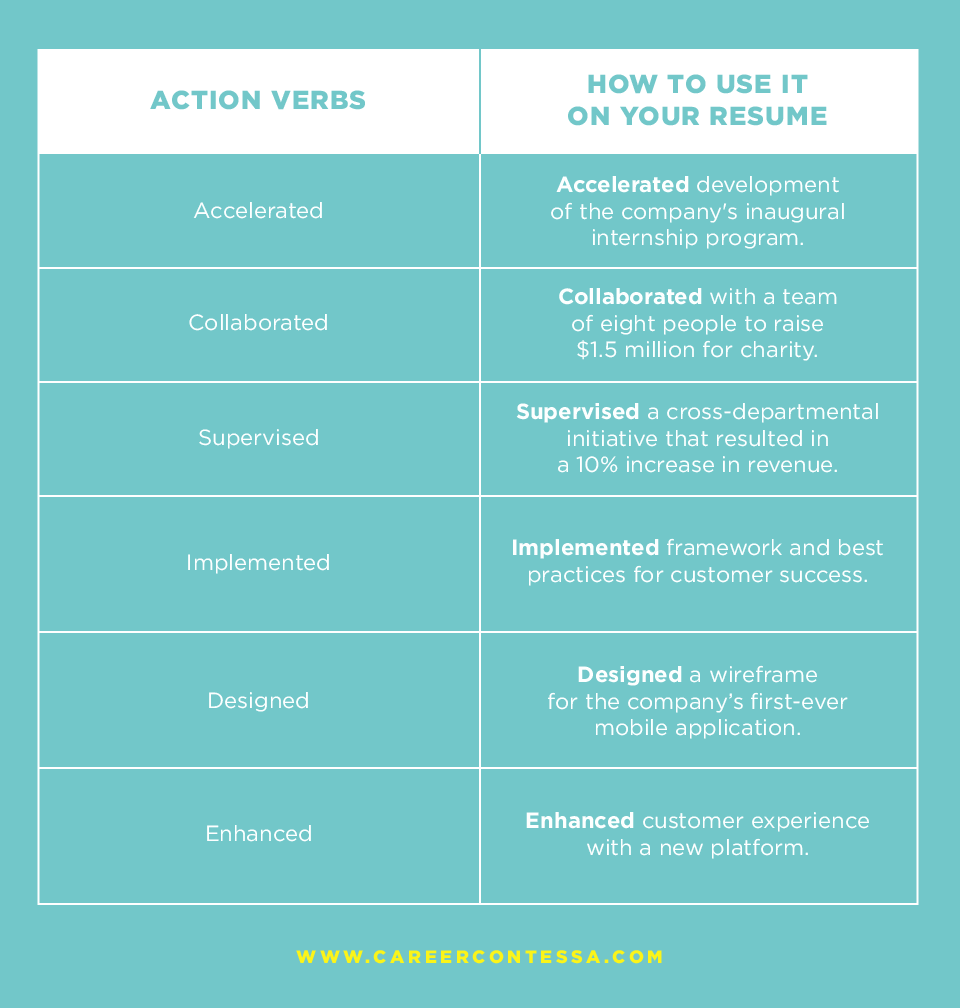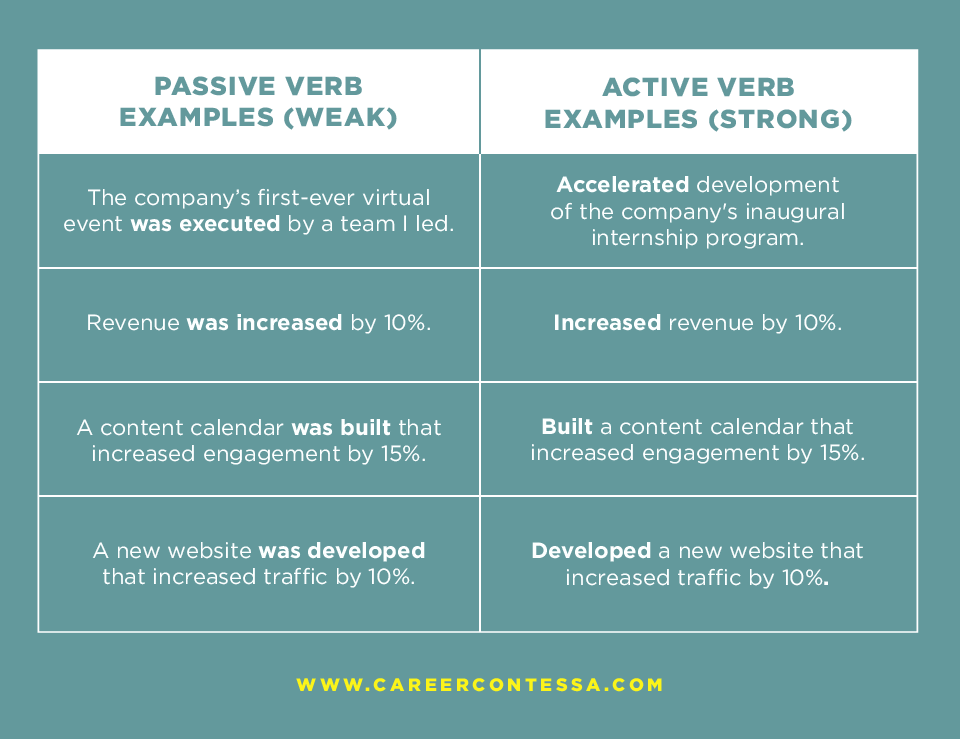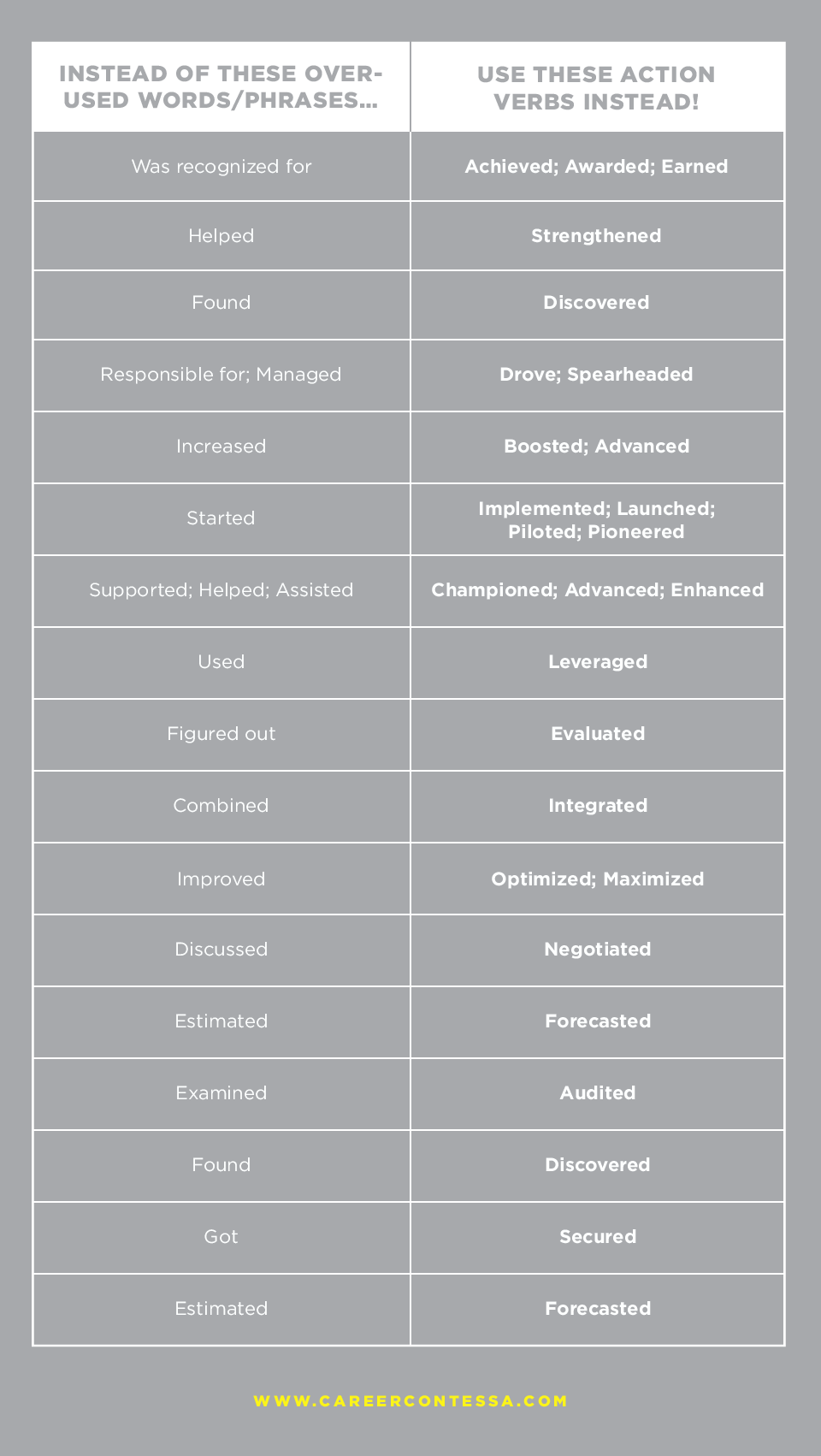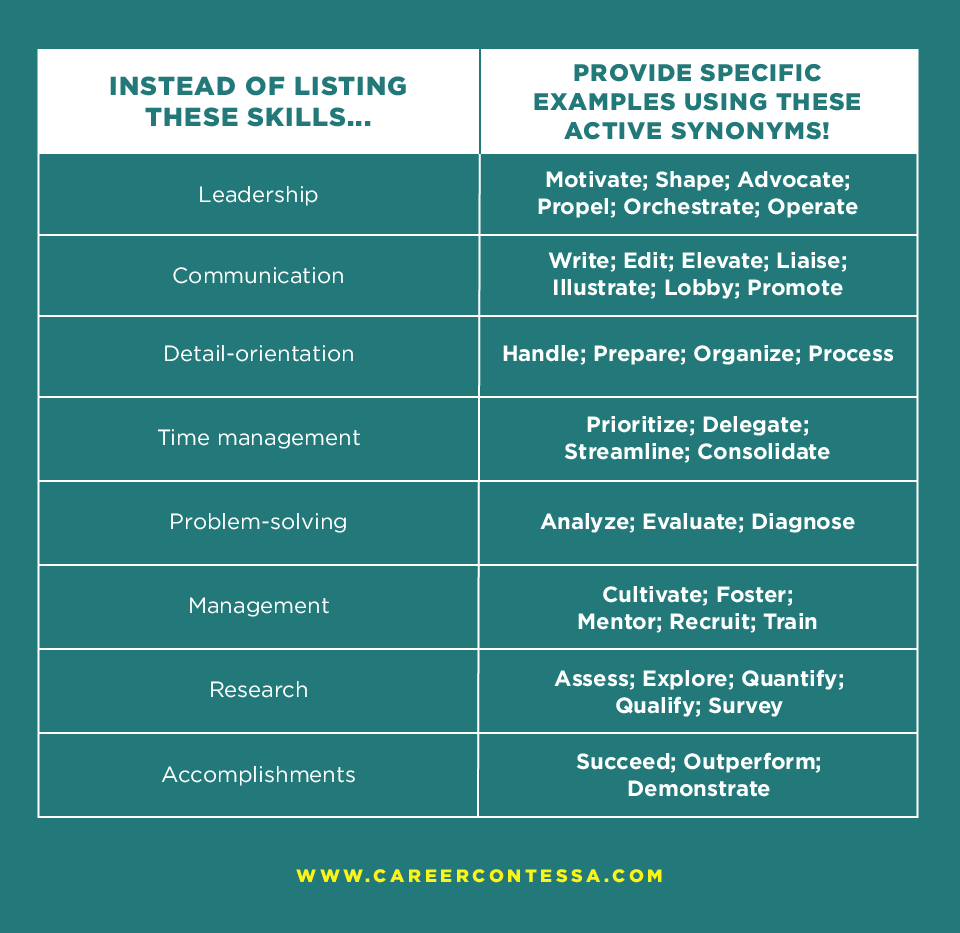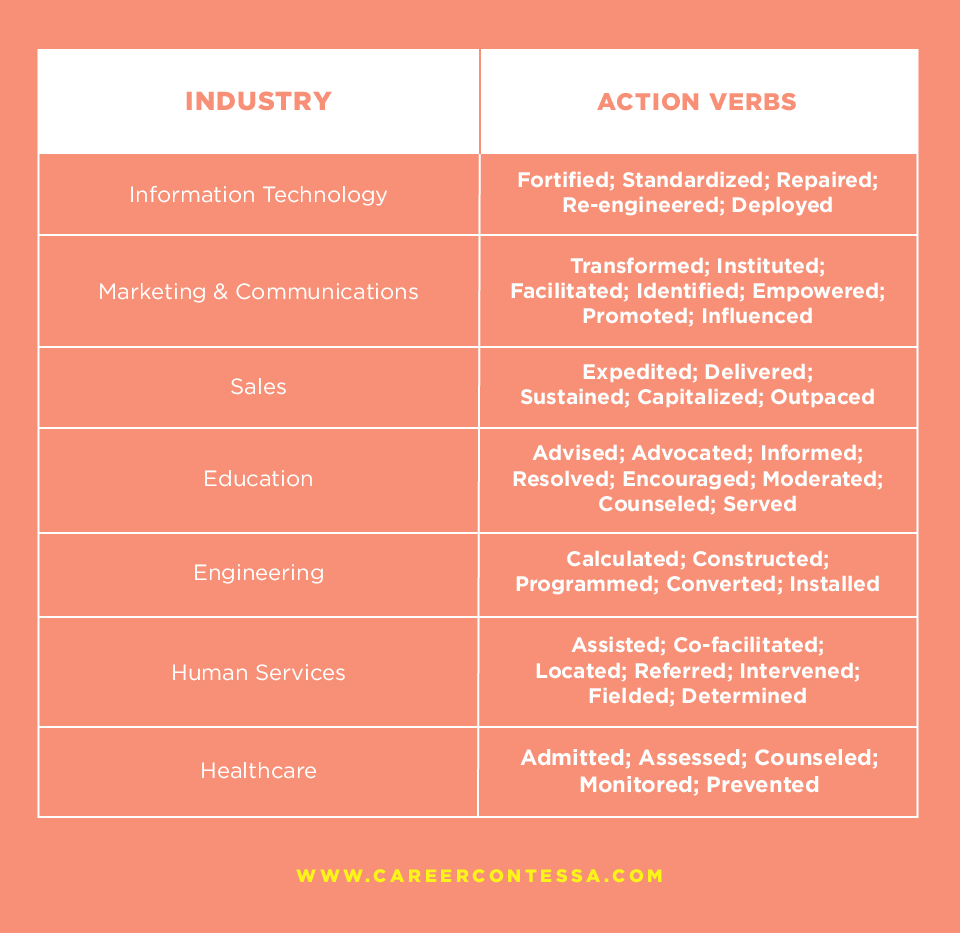Imagine you are the recruiter or hiring manager at your dream company.
After making your first cup of coffee in the morning (or third, we don’t judge!), you sit down at your desk, ready to take on the day. You’re hiring for a new position, and this morning Human Resources sent over some candidates that look promising.
After scanning approximately 10 resumes, your eyes start to blur because each one looks the same. They're all
using the same words to compile what they did in their previous job—all in the past tense.
That is until one resume graces your computer screen, which is clearly a cut above the rest.
It's the resume that finally shows how a candidate uses their communication skills—in the present tense!
The Resume Secret Sauce? Action Verbs
What makes
this resume stand out, you might ask? Simple! Action verbs.
Of course, there are plenty of other ways to
ensure your resume stands out, such as formatting, keywords, a punchy objective, just to name a few.
Some jobs require
a cover letter, some don’t—but the fact remains that there are small tweaks you can make to ensure your resume immediately captures a hiring manager’s attention.
So first, let’s get back to basics and focus on strong action verbs for your resume! Swap out a few words here and there, and recruiters will be knocking on your proverbial door in no time.
If you want to skip ahead to the words, go ahead:
How Do Action Verbs Help My Resume?
For those of us who didn’t major in English, here’s a quick refresher: an action verb describes a specific action, task, or movement that answers the question, "What is the subject doing?"
They are used to add impact to a sentence to provide relevant and important information, so they are key to an impressive resume.
Here’s an example: Supervised a team as the Marketing Manager for 3 years.
In this case, “supervised” is the action verb.
Action verbs are the opposite of linking verbs. Linking verbs do not express action, and instead connect the subject of a sentence with a word that gives more information about the subject.
For example: I have been a Marketing Manager for 3 years.
In this case, “been” is the linking verb.
When writing bullet points for your resume, it’s important to use action verbs because they provide information to hiring managers in a clear and concise way.
Some examples of career-specific action verbs (and how to use them on your resume) include:
- Accelerated: Accelerated development of the company's inaugural internship program.
- Collaborated: Collaborated with a team of eight people to raise $1.5 million for charity.
- Supervised: Supervised a cross-departmental initiative that resulted in a 10% increase in revenue.
- Implemented: Implemented framework and best practices for customer success.
- Designed: Designed a wireframe for the company’s first-ever mobile application.
- Enhanced: Enhanced customer experience with a new platform.
What Are Passive Verbs vs. Active Verbs?
This is where it can get a little tricky, but once you nail down using active verbs instead of passive verbs, your resume—and your writing—will improve exponentially.
In short, passive verbs refer to someone who receives the action, rather than someone who performs the action. Not only does using active verbs make your resume more engaging, it reduces the number of words you need to get your point across.
So when is it okay to use passive verbs or passive voice? If you don’t want your audience to know who is performing the action, or if the action itself is what’s important, then it’s recommended that you use passive voice. However, since a resume is all about you, it generally wouldn’t be appropriate. It’s best to stick to an active voice.
Ultimately, the goal is to catch the hiring manager’s attention immediately, so you want to avoid superfluous words that detract from all of your achievements.
Here are some examples of active verbs to help transform your resume:
Pro Tip: Pretend there is an “I” at the beginning of every bullet point on your resume, which forces you to immediately use an action verb. If one verb isn’t quite working, no worries—there are plenty of other
resume buzzwords to consider.
How to Liven Up Your Accomplishments with Action Verbs
Trust us, your resume is not the time to be humble! On the contrary, it’s time to channel your inner Lizzo and “boss up and change your life” — by shouting your accomplishments from the rooftops!
In the best case scenario, you’ve been documenting all of your achievements as they happen — but if not, no worries! That just means it’s time to take a deep dive into past roles in order to highlight why you are a good fit for this new one.
Pro Tip: Once you find a position that you’re interested in, be sure to study the job description and pull out the keywords and skills that they’re looking for in a new hire. This will help hiring managers immediately identify relevant achievements.
The best way to illustrate your amazing career accomplishments is through powerful action verbs. Instead of using tired verbs like led, handled, and managed (aren’t you yawning just looking at those?), infuse some creativity and spark into those resume bullet points with more impactful words.
One More Pro Tip: We are going to give you a list of action verbs. Use the words that could naturally come out of your mouth. The last thing you want is for a hiring manager to think you pulled out the old thesaurus to get the job done. Be you.
Here are some examples of action verbs you can use to show and tell.
How to Show That You Streamlined a Process
Expedited the purchase order process by researching, vetting and securing a new contract management software, saving employees an average of three hours of extra work per contract.
Integrated Salesforce dashboard with company’s intranet to eliminate cross-departmental silos.
Other active verbs to use if you streamline a process:
- Revamped
- Centralized
- Simplified
- Strengthened
- Modified
How to Show That You Brought in New Business
Secured new business with a Fortune 500 company, boosting overall revenue for 2021 by 15%.
Generated $1.5 million in new business for FY20-21.
Other active verbs to use if you brought in new business:
- Established
- Navigated
- Partnered
- Negotiated
- Built
How to Show That You Led a Team
Mentored a team of recent graduates and fostered a culture of empathy, transparency and trust.
Supervised a work group dedicated to improving diversity and inclusion, and amplified employee engagement by 40% in 2020.
Other active verbs to use if you led a team:
- Facilitated
- Mobilized
- Shaped
- Hired
- Cultivated
How to Show That You Provided Support or Used Your Problem-Solving Skills
Resolved ongoing technology issues within the hospital’s patient support portal.
Arbitrated a disagreement between a manager and their direct report.
Other active verbs to use if you provided support:
- Informed
- Reconciled
- Clarified
- Rectified
- Communicated
How to Show That You Conducted In-Depth Research
Surveyed 5,000 members to increase relevance and improve content development strategy.
Forecasted education trends for teachers to utilize during the upcoming school year.
Other active verbs to use if you conducted in-depth research:
- Discovered
- Tested
- Interpreted
- Piloted
- Evaluated
How to Strengthen Your Resume Using Action Verbs
When you consider the fact that recruiters and hiring managers are likely scanning dozens of resumes every day, it can be a challenge to figure out how to stand out from the crowd. Here are a few steps you can take to elevate your resume:
Below, we created a chart to help you upgrade your resume using strong verb synonyms. The words and phrases in the left-hand column are not necessarily wrong; however, they are typically overused.
Consider turning up the heat with this action verb list. Using these action verbs will automatically make your resume more unique!
Even More Strong Resume Action Verbs
Here are even more words to use instead of the old verbs everyone is using. Instead of these overused words and phrases, try some of these action verbs to illustrate the direct impact you made.
Synonyms for Examined
- Audited; Surveyed; Explored
Synonyms for Found
- Discovered; Determined; Identified
Synonyms for Got
- Secured; Established; Captured
Synonyms for Changed
- Converted; Modified; Replaced
Synonyms for Updated
- Overhauled; Upgraded; Revised
Synonyms for Taught
- Upskilled; Educated; Cultivated
Synonyms for Led
- Directed; Steered; Supervised
Synonyms for Combined
- Merged; Centralized; Consolidated
Synonyms for Increased
- Amplified; Escalated; Strengthened
Synonyms for Prepared; Organized
- Mobilized; Developed; Standardized; Assembled; Compiled
Synonyms for Made
- Forged; Engineered; Constructed; Created
Synonyms for Handled
- Fielded; Controlled; Maneuvered
Synonyms for Recommended; Advised
- Advocated; Advanced; Counseled
Synonyms for Outlined
- Mapped; Indicated; Delineated
Synonyms for Urged
- Lobbied; Persuaded; Influenced
Synonyms for Assigned
- Delegated; Allocated; Earmarked
Synonyms for Carried out
- Enforced; Fulfilled; Executed
Synonyms for Exceeded
- Surpassed; Eclipsed; Outperformed
Synonyms for Planned
- Designed; Envisioned; Formulated
Synonyms for Wrote
- Authored; Composed; Produced
Synonyms for Created
- Designed; Initiated; Invented
Synonyms for Assisted
- Facilitated; Empowered; Accommodated
Synonyms for Participated, Took part in
- Joined; Engaged; Performed
Synonyms for Showed
- Illustrated; Unveiled; Demonstrated
Synonyms for Studied
- Investigated; Explored; Surveyed
Synonyms for Thought through
- Deliberated; Debated; Considered
Synonyms for Explained
- Deciphered; Clarified; Mitigated
Synonyms for Supported
- Promoted; Advocated; Authorized
Active Synonyms to Use for Key Skills on Your Resume
Anyone can list their leadership skills or
communications skills, but what does that actually mean? How have you demonstrated that in your current or previous roles?
When hiring managers and recruiters read through resumes, they want to know exactly how you contributed to previous companies and how you might continue to do so in a new role.
Ideally, you should list between five and 10 key skills on your resume. However, instead of just simply listing those skills, consider providing bullet points that illustrate specific examples.
Here’s an example of what a communications professional might have on their resume—and how they can transform these skills into active examples to make a much bigger impact:
- Show Leadership: Advocate for high-performing team members.
- Show Communication: Elevate clients through strategic public relations campaigns.
- Show Time Management + Organizational Skills: Streamline content creation processes by evaluating and introducing new management platforms.
- Show Management Experience: Recruit diverse talent.
- Show Accomplishments: Consistently outperform KPIs by 10%.
That is just an example for one specific industry, but if you’re looking for additional action verbs to amplify your skills on your resume, check out the below chart.
Instead of listing these skills, provide specific examples using these active synonyms!
- Leadership
Motivate; Shape; Advocate; Propel; Orchestrate; Operate
- Communication
Write; Edit; Elevate; Liaise; Illustrate; Lobby; Promote
- Detail-orientation
Handle; Prepare; Organize; Process
- Time management
Prioritize; Delegate; Streamline; Consolidate; Decrease
- Problem-solving
Analyze; Evaluate; Diagnose
- Management
Cultivate; Foster; Mentor; Recruit; Train; Drew
- Research
Assess; Explore; Quantify; Qualify; Survey
- Accomplishments
Succeed; Outperform; Demonstrate
How to Use Industry-Specific Action Verbs
Resumes are not one size fits all, and it’s important to pay attention to the
keywords in a job description and adjust it depending on what’s listed.
Hiring managers can tell if potential candidates took the time to customize their resumes for the specific role, or if they are probably sending out the same version to everyone. This tailored language will also show that you have the qualifications to understand and excel at the role.
If you’re struggling to find industry-specific action verbs, here are some examples that might help amp up your resume:
- Information Technology
Fortified; Standardized; Repaired; Re-engineered; Deployed
- Marketing & Communications
Transformed; Instituted; Facilitated; Identified; Empowered; Promoted; Influenced
- Sales
Expedited; Delivered; Sustained; Capitalized; Outpaced
- Education
Advised; Advocated; Informed; Resolved; Encouraged; Moderated; Counseled; Served
- Engineering
Calculated; Constructed; Programmed; Converted; Installed
- Human Services
Assisted; Co-facilitated; Located; Referred; Intervened; Fielded; Determined
- Healthcare
Admitted; Assessed; Counseled; Monitored; Prevented
More Resume Writing Resources
At the end of the day, remember to put yourself in the hiring manager’s shoes and consider what you would want to see in a resume if roles were reversed and you were the one hiring for the position. If you are in the process of crafting the perfect resume, here are some resources to check out.
If you need more ideas for strong action verbs to use on your resume, all you have to do is Google synonyms and action verbs, and a whole library of words will be available to you.
If you have a
mentor who you trust in your industry, consider meeting with them to discuss how you can improve your resume. They might have some great insight!
College students, check out the career center at your school to find out if they offer free resume consultations.
